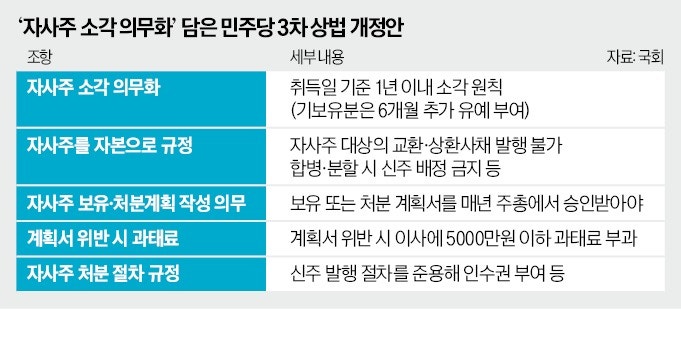Business Sector Concerned About Disappearing Governance Defense Mechanisms, The Democratic Party of Korea proposed the third amendment to the Commercial Act on the 24th, which mandates the cancellation of treasury shares within one year. If not canceled, they must be retained or disposed of under strict conditions requiring shareholder approval. The business community is concerned that even the last defense mechanism for corporate control may disappear.’,
,
, According to political sources on the 24th, the Democratic Party’s Kospi5000 Special Committee aims to pass the third amendment to the Commercial Act (Treasury Stock Reform Act) within the year. The amendment was proposed by Oh Ki-hyoung, chair of the special committee.’,
,
, The special committee classified treasury stocks as capital rather than assets, fundamentally blocking acts such as transferring shares to friendly parties or issuing exchangeable bonds (EB) based on treasury stocks. It plans to enforce mandatory cancellation within one year for newly acquired treasury stocks and, in principle, for existing ones. However, existing treasury stocks were given an additional six-month grace period.’,
,
, The amendment also allows exceptions for holding or disposing of treasury shares for employee compensation or financial structure improvement, but it requires obtaining approval for a ‘Treasury Stock Retention and Disposal Plan’ through a shareholder general meeting’s ordinary resolution. It’s viewed as practically ineffective as short-term shareholders are unlikely to sacrifice immediate stock price increases to approve such plans.’,
,
,

,
, If the ‘Third Commercial Act Amendment’ (Treasury Stock Reform Act) proposed by the Democratic Party on the 24th is passed by the National Assembly, the use of treasury stocks by companies for defending corporate control will be fundamentally blocked. This is because newly acquired treasury stocks must be canceled within a year, and existing ones within a year and a half, and treasury stocks cannot be the target of exchange, redemption, pledge, or allocation of new shares in mergers or divisions.’,
,
, Lawyer Ahn Hee-chul of Law Corporation DLG explained, “This means that asset-based actions, such as transferring shares to friendly forces or issuing exchangeable bonds (EB) based on treasury stocks, will all become difficult.” Oh Ki-hyoung stated that, “There are frequent cases where company management acquires treasury stocks with company assets and arbitrarily uses them for the benefit of specific shareholders, infringing on the interests of general shareholders,” explaining the reasoning behind the proposal.’,
,
, The Democratic Party has allowed exceptions for treasury stocks intended for employee compensations, such as stock options and employee stock ownership associations, to be retained instead of canceled. Disposing of treasury stocks for managerial purposes specified in the articles of incorporation, such as financial structure improvement or new technology introduction, is also permitted.’,
,
, However, it is generally considered that companies may find it difficult to utilize the exceptions. The amendment requires companies to draft a ‘Treasury Stock Retention and Disposal Plan’ and obtain an ordinary resolution vote at an annual general meeting of shareholders to retain or dispose of treasury stocks without cancellation. The ordinary resolution requires the presence of more than half of the attending shareholders and more than one-fourth of the total shares issued. If business purposes are not specified in the articles of incorporation, a stricter special resolution (two-thirds of attending shareholders and one-third of the total shares issued) is required.’,
,
, The amendment also includes a provision for a fine of up to 50 million won against directors personally if the principle of cancellation within a year is not adhered to or if the approved Treasury Stock Retention and Disposal Plan is violated. The Democratic Party plans to pass the bill within the year.’,
,
, Experts are concerned about possible side effects. Choi Joon-sun, Professor Emeritus at Sungkyunkwan University, said, “Without introducing measures like differential voting rights or poison pills (rights to acquire new shares), disputes over corporate control with activist funds will only increase.” Furthermore, it is observed that there might be a reduction in stock price boosting by purchasing treasury stocks, as disposing of them becomes problematic.’
,
,

